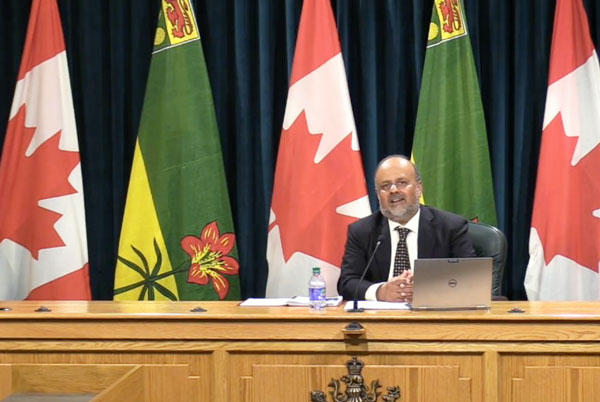
The province reported on Tuesday that a resident of the North Central zone, which includes Prince Albert, has had the B1.351 SA (South Africa) COVID-19 variant detected in their test. The individual was tested at the end of January and Public Health’s investigation is ongoing.
During a press availability on Thursday, Chief Medical Health Officer Dr. Saqib Shahab explained that deaths and hospitalizations are trending down but we are still seeing hospitalizations and that we should continue to stay the course with following health measures.
“Especially because we have seen over the last week that we have found increased isolations of variants of concern not just linked to international travel but showing some initial start of community transmission events of them as well,” Shahab said.
The B1.1.7 UK (United Kingdom) variant has also been detected in two residents in the Regina zone. These individuals were tested at the end of January. Based on the contact investigation to date, there is no link to travel at this time but public health’s investigation is ongoing.
There is also a presumptive case of B1.1.7 UK in one individual in the Saskatoon zone. The individual was transferred from out of province to Saskatoon for acute care.
Whole genome sequencing will need to be completed to confirm the results and health’s contact investigation is ongoing.
The province’s own documents have indicated that Saskatchewan is on track to reduce its cases to a point where health restrictions can be lifted only if people rigidly follow public health orders and no virus variants of concern pop up.
Saskatchewan Health Association CEO Scott Livingstone also addressed the caution around the variants being in the province.
“While there have been lower case numbers at time in recent weeks the existence of variants of concern is very concerning. This may fuel exponential growth of cases as Dr. Shahab has said. So in the days ahead we are going to need to maintain our diligence, vigilance and moderate these trends very closely,” Livingstone said
Shahab explained that COVID-19 testing was just one measure along with things such as physical distancing and mask use.
“Testing is an important layer because by testing we know what our status is and if COVID positive we can, for the most part, safely isolate at home for 10 days. For many people it is a milder illness. We can also immediately notify our close contacts so they can isolate for 14 days. And that really is essential to break the chain of transmission.”
According to Shahab some people in the province have delayed testing after having symptoms for a few days resulting in outbreaks at workplaces and to make sure you get tested.
“You can get tested right away at the onset of symptoms now but if your test is negative and your symptoms are continuing, do get tested again just to make sure that your are COVID negative. I think testing will be an important layer in an ongoing fashion along with easier access to many varieties of testing that will really increase our ability to show a downward trend,” Shahab said.
Livingstone also noted the need to follow health orders to continue this downward trend.
“We are not out of the woods yet and we can’t take our foot off the gas with respect to adhering to public health orders and insuring that we keep everyone safe as we move through the vaccination program,” he explained.
According to Shahab, people should remain vigilant of the most vulnerable as that group continues to be vaccinated
“Older age groups are so close to getting vaccinated over the next few weeks and months and I think we should do everything we can to shield the people who are older, who are more vulnerable so that they can successfully get vaccinated. And as you have seen even from our observations, a vaccination is an important step to reduce your chance of getting seriously ill and hopefully over the next few weeks and months that will show in declining hospitalizations and declining deaths,” Shahab said.
Both Shahab and Livingstone sent their condolences to the family and friends of the four individuals who passed away due to COVID-19 since Tuesday moving the number who have died since the beginning of the pandemic to 380.
“This high number of deaths from COVID in the last couple of months is having a large emotional toll not just on families and friends of those loved ones who passed away but on healthcare workers who work and do everything they can to insure they save lives and protect those individuals across the province from COVID,” Livingstone said.

